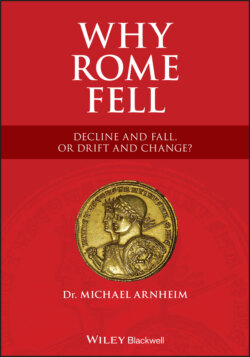Читать книгу Why Rome Fell - Michael Arnheim - Страница 49
“Rem Publicam…in Senatus Populique Romani Arbitrium Transtuli”
ОглавлениеAugustus’s vaunted restoration of the Republic: In his autobiography, Augustus claimed that, in 27 BCE, “I transferred the state from my own power to the control of the Roman Senate and People.” (Aug. R.G. 34.) Fergus Millar appears to have taken this literally, meaning the “…restoration of the citizen body to its rightful place within the constitutional structure of the res publica and its politics,” which “…provides the analytical framework for a very different understanding of what happened in 27 BC than we might gather from reading the Annals of Tacitus.” (Guy MacLean Rogers,“Intro: Polybius Was Right” –Millar 2002, p. xiv.) Rogers emphasizes the phrase “and the Roman people” as if that is in some way significant. This is a misunderstanding of the passage in Augustus’s autobiography, which is simply that he transferred the res publica (the state) from his own power to the arbitrium (discretion, or better, control or dominion) of the Senatus Populusque Romanus, (The Roman Senate and People) (SPQR), the traditional corporate designation of the Roman Republic. So, what Augustus is saying here is that he restored the Republic, which of course is false but which was a major theme in his propaganda. The mention of populusque (and the people), does not have any special significance.
Egypt: Rogers also makes much of the claim in Augustus’s autobiography that he had added Egypt “…to the imperium of the Roman people.” (Aug. R.G., 27.) Why not again to the Roman Senate and People, SPQR? The omission of the “Senate” here is significant, but not for the reason that Rogers suggests. Augustus is certainly not claiming to have handed Egypt over to one of the popular assemblies. Egypt was newly conquered from Cleopatra (allied to Mark Antony), and Augustus ruled it as part of his own patrimonium (private estate) because he did not want the Senate or any senator to gain control of this rich province. So, the governor of Egypt was never a senator but always an equestrian with the title of “prefect”, and no senator was allowed even to set foot in Egypt without express imperial consent. How was Augustus to publicize his acquisition of Egypt in his autobiography? He could not very well say, “I added Egypt to my own private estate.” And he also did not want to say that he had given it to the Roman Senate and People, because then the Senate could have gotten its hands on it. So, he just said that he had added it to the imperium, of the Roman people. The term imperium in this context belongs to the category of what Lewis and Short call “publicists’ language,” with the multiple meanings of “supreme power, sovereignty, sway, dominion, and empire.” (Lewis and Short, s.v. imperium.) This had nothing to do with the popular assemblies but was simply a vague propaganda claim that Egypt was now under Roman control and the “people” certainly never had any say over Egypt or over who was to govern it.
“Ironic victory”: Rogers suggests that:
[I]t is possible to argue” that the Augustan “monarchy itself was one of the (unintended) consequences of the struggle between some of the nobiles and the populus Romanus over the question of who was the sovereign power in the res publica. If we look at the breakdown of the Roman Republic from this perspective, we might see the emergence of a monarch from among the nobiles in 27 BC as an ironic victory for that democratic element in the Roman constitution, the Roman people. (Millar 2002, loc. 206.)
This is muddled. The fall of the Roman Republic was indeed the victory over the senatorial aristocracy by the people’s champion, first Julius Caesar and then his heir, Augustus. But it makes little sense to suggest that this amounted to the victory of the “…democratic element in the Roman constitution, the Roman people.” Moreover, if the Roman people had exercised as much power in the Republic as Millar and Rogers seem to believe, why would they have wanted to destroy the Republic? Yet Julius Caesar had made no bones about his contempt for the Republic by accepting an indefinite dictatorship and by describing the Republic as just “…a name without substance or form.” Augustus’s victory was not of democracy but of a form of monarchy that artfully concealed its true nature and managed to survive, with some modifications, for some 300 years.
